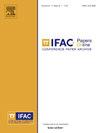复杂动力系统的模型还原:基于灵敏度的方法
Q3 Engineering
引用次数: 0
摘要
对于非线性状态空间模型的模型简化,经验格拉姆框架经常用于各种学科(例如,化学和机械工程)。经验格兰曼的数值计算被认为是计算要求很高的,而且并不总是很精确。为了纠正这些不准确性,经常使用来自稳态的扰动,从而忽略了基本的动力学。通过从系统识别的角度分析非线性模型简化问题,其中初始条件x0被视为参数,我们表明这些问题得到了更好的处理。此外,我们的方法允许对众所周知的非线性系统的可观测性矩阵进行精确的零空间计算。这些(缺乏)可观察性的结果可以通过用计算机代数软件解决一个适定问题(就复杂性而言)来验证。我们用几个例子证明了非线性动力系统的约简性和可观测性。本文章由计算机程序翻译,如有差异,请以英文原文为准。
Model Reduction of Complex Dynamical Systems: A Sensitivity Based Approach.
For model reduction of non-linear state space models the empirical Gramian framework is frequently used in various disciplines (e.g., chemical and mechanical engineering). Numerical computation of empirical Gramians is known to be computationally demanding and not always very accurate. To remedy these inaccuracies, perturbations from steady states are often used, thereby omitting essential dynamics. By analysing the non-linear model reduction problem from a system identification perspective where the initial conditions x0 are viewed as parameters, we show that these issues are better handled. In addition, our approach allows for an accurate null-space computation of the well-known observability matrix for non-linear systems. These (lack of) observability results can be verified by solving a well-posed problem (in terms of complexity) with computer algebra software. We demonstrate both reduction and observability of a non-linear dynamical system in a few examples.
求助全文
通过发布文献求助,成功后即可免费获取论文全文。
去求助
来源期刊

IFAC-PapersOnLine
Engineering-Control and Systems Engineering
CiteScore
1.70
自引率
0.00%
发文量
1122
期刊介绍:
All papers from IFAC meetings are published, in partnership with Elsevier, the IFAC Publisher, in theIFAC-PapersOnLine proceedings series hosted at the ScienceDirect web service. This series includes papers previously published in the IFAC website.The main features of the IFAC-PapersOnLine series are: -Online archive including papers from IFAC Symposia, Congresses, Conferences, and most Workshops. -All papers accepted at the meeting are published in PDF format - searchable and citable. -All papers published on the web site can be cited using the IFAC PapersOnLine ISSN and the individual paper DOI (Digital Object Identifier). The site is Open Access in nature - no charge is made to individuals for reading or downloading. Copyright of all papers belongs to IFAC and must be referenced if derivative journal papers are produced from the conference papers. All papers published in IFAC-PapersOnLine have undergone a peer review selection process according to the IFAC rules.
 求助内容:
求助内容: 应助结果提醒方式:
应助结果提醒方式:


